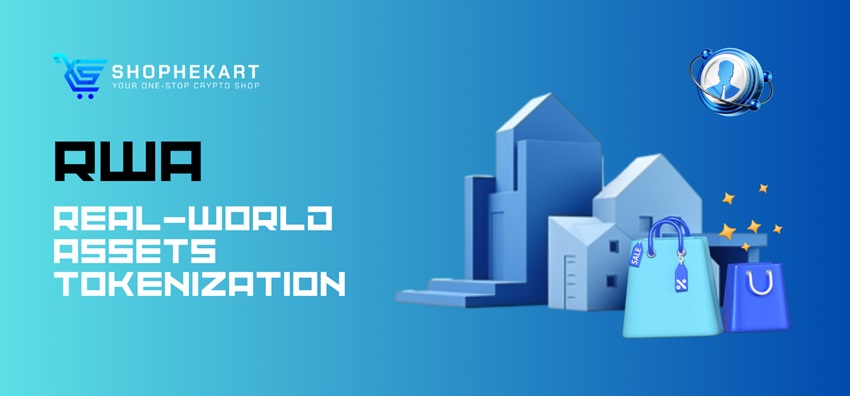
Dubai, UAE — November 7, 2024 — In an era where technological advancements are driving profound changes across industries, Real World Assets (RWAs) have emerged as a groundbreaking trend, particularly in the investment and financial sectors. RWAs are tangible assets—such as fine art, luxury goods, real estate, and collectibles—that hold intrinsic, physical value in the real world. These assets represent wealth in its most classic forms but have historically been accessible to only a select few due to high entry costs, market exclusivity, and complex regulatory landscapes. However, with the advent of tokenization and decentralized technologies, the RWA sector is transforming, creating new investment pathways that transcend the limitations of traditional markets.
Real World Assets (RWA): The Growing Trend
The concept of tokenizing RWAs is gaining momentum globally as it offers a revolutionary way for both individuals and institutions to invest in, own, and interact with high-value assets. Tokenization involves converting physical assets into digital tokens that can be divided, traded, or held in fractions. This process of digital representation brings unprecedented flexibility and accessibility to the world of high-value assets. For example, rather than requiring millions to invest in real estate, tokenization allows for fractional ownership, enabling investors to own a portion of a property at a fraction of the traditional cost.
This trend has far-reaching implications in the investment world. By breaking down high entry barriers, tokenization democratizes access to wealth-generating assets, making them available to a broader, more diverse pool of investors. It also addresses a long-standing issue in the world of high-value assets—liquidity. Traditionally, assets like real estate or fine art are illiquid, meaning they can’t be quickly or easily sold. However, tokenization introduces liquidity by creating a digital marketplace for these assets, allowing tokens to be bought, sold, or traded just as seamlessly as stocks or other securities. This increased liquidity allows investors to manage their portfolios with greater flexibility and agility, adjusting their holdings in response to market trends and personal financial goals.
Moreover, tokenized RWAs offer a solution to the often opaque valuation and ownership processes associated with traditional assets. By providing digital records that track ownership, value changes, and transaction history, tokenization enhances transparency, reduces transaction costs, and opens up new opportunities for individuals who were previously excluded from high-value asset investments. In this new landscape, anyone with an internet connection can engage with RWAs, participate in fractional ownership, and enjoy the benefits of diversified asset exposure.
The Role of Decentralization in RWA Tokenization
At the heart of this new RWA market is decentralization, a powerful force that further enhances the value and accessibility of tokenized assets. Decentralization eliminates the need for intermediaries—such as brokers, banks, and traditional financial institutions—that typically serve as gatekeepers in conventional asset transactions. By removing these middlemen, decentralized platforms empower individuals with direct access to assets and allow for peer-to- peer transactions, reducing associated fees and delays.
The decentralization of RWA tokenization platforms also brings about a level of transparency and security that traditional systems struggle to match. Decentralized platforms utilize blockchain technology to record each transaction on an immutable ledger, making every transaction traceable, secure, and tamper-proof. This not only builds trust among users but also ensures accountability, as each asset’s history, ownership, and transactions are recorded in real-time and publicly verifiable. This transparency is crucial for RWAs, as it gives investors confidence that the digital representation of an asset aligns with its actual, physical counterpart.
Beyond transparency, decentralization enhances security by reducing the vulnerability associated with centralized control. With decentralized systems, there is no single point of failure. Instead, data and asset ownership records are distributed across a network, making it significantly more difficult for hackers or bad actors to manipulate or compromise information. This robust framework enables users to engage with tokenized assets confidently, knowing that their investments are safeguarded within a secure, transparent ecosystem.
As decentralized platforms continue to mature and attract more users, they offer a glimpse into the future of asset ownership. By making high-value assets accessible and tradable on a global scale, decentralization facilitates the transition from traditional asset ownership models to a more inclusive, democratized form of investment. This shift not only redefines how assets are bought and sold but also aligns with the evolving demands of a new generation of investors who value control, transparency, and financial inclusivity.
A Future-Ready Approach to RWA Tokenization
The convergence of RWA tokenization and decentralized technology represents a significant evolution in the investment landscape. It has the potential to reshape traditional asset markets, breaking down barriers that have historically restricted access to only the wealthiest investors. In this new environment, assets that once required high capital investment or exclusive access are now available to anyone, regardless of their location, financial status, or connections.
This trend toward tokenized RWAs aligns with a broader movement towards financial inclusion, where technology serves as a bridge connecting people to wealth-building opportunities. As more assets become tokenized and decentralized platforms evolve, the RWA sector will play an increasingly vital role in democratizing finance. This shift marks a future where tangible assets can be held, traded, and accessed with the same ease as digital assets, offering a flexible, resilient, and more accessible framework for global investment.
In the rapidly changing world of finance and investment, RWAs and decentralization are not only trends; they’re part of a larger transformation that’s reshaping the foundations of ownership and wealth creation for generations to come.
Media Details.
Company Name: Shophekart
Contact Name: Muhammada
Email: marketing@shophekart.com
Country: Dubai, UAE
Website: https://shophekart.com